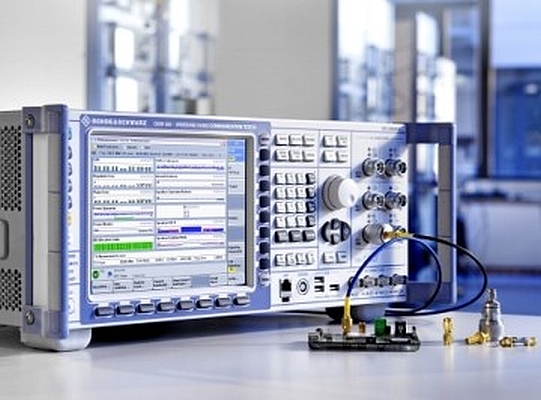- Rohde & Schwarz offers a Bluetooth 5.1 test solution by upgrading its R&S CMW test platform software.
- The Bluetooth 5.1 test solution can be used to verify the performance of location services that are more accurate with the new Bluetooth 5.1 specification.
With the Bluetooth Core version 5.1 (BT 5.1) specification ratified by the Bluetooth SIG at the end of January, devices using the Bluetooth Low Energy (BLE) wireless communication protocol can provide enhanced navigation services as an option.
Additional functionality for determining the direction (angle estimation) using the arrival angle (AoA) and departure angle (AoD) methods allows the position to be determined to the nearest centimetre in both the transmitting and receiving direction. Previous solutions could only provide accuracy in the order of one meter.
Bluetooth Low Energy 5.1 therefore provides increased accuracy for tracking equipment inside buildings and geolocation. The Bluetooth Special Interest Group (SIG) predicts that by 2022, approximately 400 million additional devices will use the Bluetooth 5.1 location service.
To test products using the Bluetooth 5.1 protocol, Rohde & Schwarz has integrated 23 new DTM (direct test mode) test cases defined in the new RF-PHY.TS.5.1.0 test specification into its BLE test solution. This allows their manufacturers to demonstrate that their products are RF interoperable with other devices and that direction finding meets the requirements of the Bluetooth 5.1 specification.
The R&S CMW test platform allows RF tests to be performed on devices operating under Bluetooth Classic, Bluetooth LE and Bluetooth 5.1. In addition to DTM and signalling tests, it supports a scope of audio tests on Bluetooth basic rate/enhanced data rate (BR/EDR) links. This platform is suitable for tests in the development phase, for preconformance tests, for qualified audio tests, and for use in Bluetooth OTA test systems.
The R&S CMW test platform uses a parametric test concept to create application-specific test sequences. Its 160 MHz modulation bandwidth also allows RF WLAN signalling tests to be conducted in accordance with IEEE 802.11a/b/g/g/g/n/ac standards, including IEEE 802.11ax. RF tests compliant with the IEEE 802.15.4 standard for Zigbee and Thread communications are also supported.






